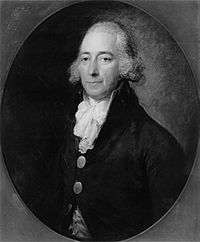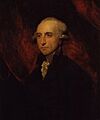William Windham facts for kids
Quick facts for kids
William Windham
|
|
|---|---|

Windham in the 1780s by Gainsborough Dupont
|
|
| Secretary of State for War and the Colonies | |
| In office 5 February 1806 – 25 March 1807 |
|
| Monarch | George III |
| Prime Minister | The Lord Grenville |
| Preceded by | Viscount Castlereagh |
| Succeeded by | Viscount Castlereagh |
| Secretary at War | |
| In office 1794–1801 |
|
| Monarch | George III |
| Prime Minister | William Pitt |
| Preceded by | Sir George Yonge, 5th Baronet |
| Succeeded by | Charles Philip Yorke |
| Personal details | |
| Born | 14 May 1750 London |
| Died | 4 June 1810 (aged 60) Pall Mall, London |
| Nationality | English |
| Political party | Whig |
William Windham (born May 14, 1750 – died June 4, 1810) was an important British politician. He was a member of the Whig party. Windham was known for his strong speeches in the House of Commons.
He was first elected to Parliament in 1784. At first, he supported the French Revolution. But later, he became against it, like his friend Edmund Burke. When Britain went to war with France in 1793, Windham supported the war. He believed it was important to fight against the ideas of the Revolution.
In 1794, he joined the government as Secretary at War. This job meant he helped manage the war effort. Later, in 1806, he became Secretary of State for War and the Colonies. He held this role until 1807. William Windham spent the rest of his life in politics, often speaking out against the government. He died in 1810.
Contents
Early Life and Education
William Windham was born in London in 1750. His family had lived in Norfolk for a long time. He went to Eton College from 1757 to 1766. There, he was known for being smart and good at sports. People even called him "Fighting Windham" because he was good at boxing.
After Eton, he studied at the University of Glasgow and then University College, Oxford. He was a very good student. One friend said he was "highly distinguished for his application to various studies." He traveled to Norway, Switzerland, and Italy.
Windham was a Christian. He wrote about his faith before taking a balloon ride in 1785. He believed in God and in Jesus Christ.
Early Political Career
Windham became involved in politics in 1778. He strongly disagreed with the American War of Independence. He gave his first public speech in Norwich, speaking against the war. He also wrote a protest against it, which 5,000 people signed.
In 1784, Windham was elected to Parliament for Norwich. He kept this seat until 1802. He was known for his speeches against Warren Hastings. Hastings was a British official accused of wrongdoing in India.
Windham did not support changing Parliament's rules. But he stayed friends with the Whig party.
Views on the French Revolution
In 1789, Windham visited France. He saw the start of the French Revolution. At first, he thought the new government would bring peace. But his ideas changed.
After reading Edmund Burke's book about the Revolution, Windham became worried. He saw the Revolution as dangerous. He believed it could spread bad ideas to Britain.
By 1792, Windham was strongly against the Revolution's principles. He wanted to protect the British system of government. He said he would join anyone who wanted to stop ideas that would "subvert the true principles of the constitution."
When France executed King Louis XVI in 1793, Britain declared war. Windham and other conservative Whigs formed a "Third Party." They supported the war against France. Windham believed Britain should help bring back the old French monarchy.
Secretary at War
In July 1794, William Windham joined Pitt's government. He became the Secretary at War. This was a very important job during wartime. He also became a privy councillor.
Windham tried to help French people who had fled the Revolution. He also supported a failed plan to invade France in 1795. He realized that other government leaders did not share his strong desire to bring back the French monarchy.
In 1801, Windham resigned from the government. This was because King George III would not allow Catholic emancipation. This meant Catholics could not have full rights.
In Opposition
After leaving the government, Windham strongly opposed the Treaty of Amiens. This treaty made peace with France in 1802. Windham believed it was a terrible mistake. He thought it would lead to Britain losing its independence.
He lost his seat in Norwich in 1802. But he quickly found another seat in Parliament for St Mawes. In 1804, he refused to join Pitt's new government. He felt it was not strong enough to face the dangers from France.
Secretary of State for War and the Colonies
In 1806, Windham became the Secretary of State for War and the Colonies. This was part of a new government led by Lord Grenville.
In this role, Windham made important changes to the British Army. He wanted to make sure the army had enough soldiers. He changed how soldiers were recruited. He also increased soldiers' pay and introduced pensions for old soldiers.
He was elected to Parliament for Norfolk in 1806. But this election was later cancelled. So, he sat for another area called New Romney.
Later Opposition and Beliefs
In 1807, Windham was elected to Parliament for Higham Ferrers. He continued to support religious freedom. He was against religious extremism.
He also disagreed with the Walcheren Expedition in 1809. This was a British military attack that failed. Windham thought the soldiers should have been sent to Spain instead. He believed it was important to fight against Napoleon's growing power in Europe.
Support for Traditional Sports
William Windham was a big supporter of traditional English sports. He was against people who wanted to ban things like boxing and bull-baiting. He believed these sports helped keep alive the "native valour" of Englishmen.
He argued that the bravery shown in sports was similar to the bravery shown by soldiers in battle. He thought these activities helped build courage and strength in people.
Death
On July 8, 1809, Windham was helping a friend save books from a burning house. He fell and hurt his hip. A tumor grew, and he needed an operation.
He had the operation on May 17, 1810. Even though the operation was successful, Windham did not recover well. He died on June 4, 1810, at his home in London. He was buried in his family's vault at Felbrigg.
A memorial was placed in Felbrigg Church. It described him as a "noble gentleman" who was "frank, generous, unassuming, intrepid, compassionate, and pious."
Legacy
William Windham was greatly influenced by Edmund Burke, a famous Whig thinker. Windham saw Burke's ideas as very important.
Many people admired Windham. Samuel Johnson, a famous writer, said Windham's conversations were brilliant. Sir James Mackintosh said Windham's talks were "full of sense, knowledge and vivacity."
Nathaniel William Wraxall described Windham as a graceful and intelligent speaker. He said Windham had a "highly cultivated understanding." He believed Windham was very similar to Burke in his ideas.
Henry Brougham noted Windham's sharp wit and deep thinking. He said Windham was a "follower" of great minds like Johnson and Burke.
The historian Thomas Macaulay called Windham "the finest gentleman of the age." He praised Windham's intelligence and spirit.
Lord Rosebery said Windham was "the finest English gentleman of his or perhaps of all time." He was a statesman, speaker, mathematician, and scholar. He was loved and respected by many.
Windham was known for his strong beliefs and personal charm. He was a unique and important figure in British politics.
Images for kids
-
William Windham by Sir Joshua Reynolds.
-
William Windham by Sir Thomas Lawrence.
 | Anna J. Cooper |
 | Mary McLeod Bethune |
 | Lillie Mae Bradford |




